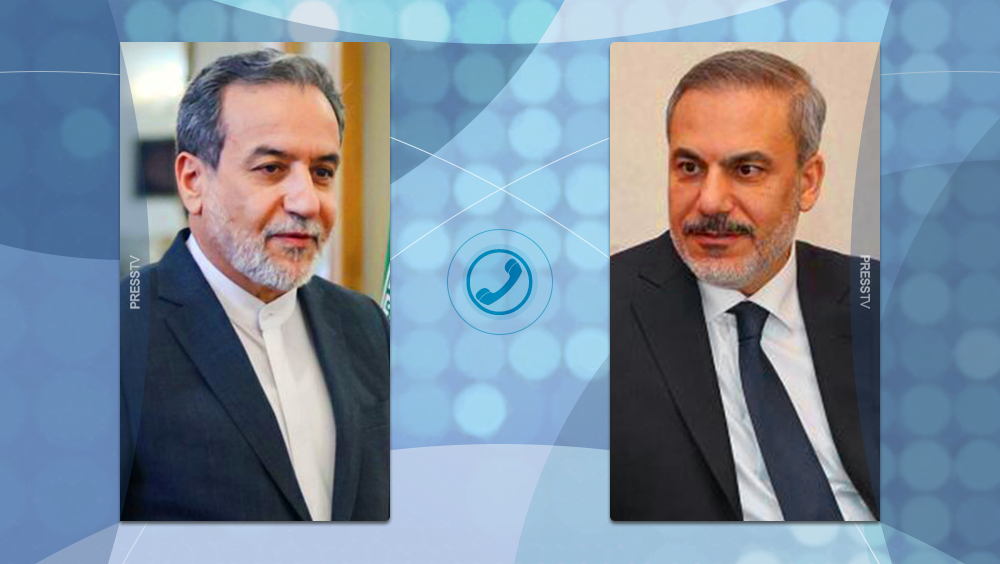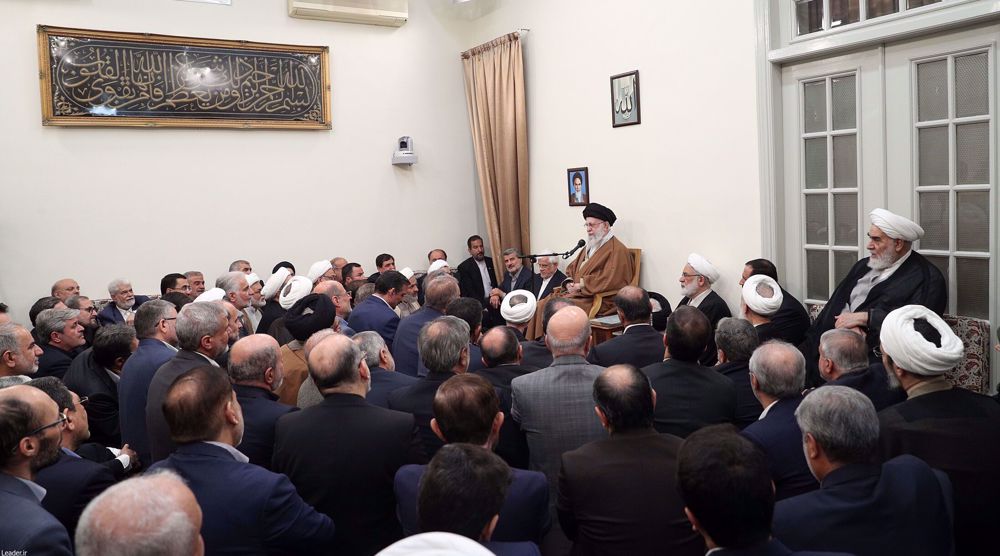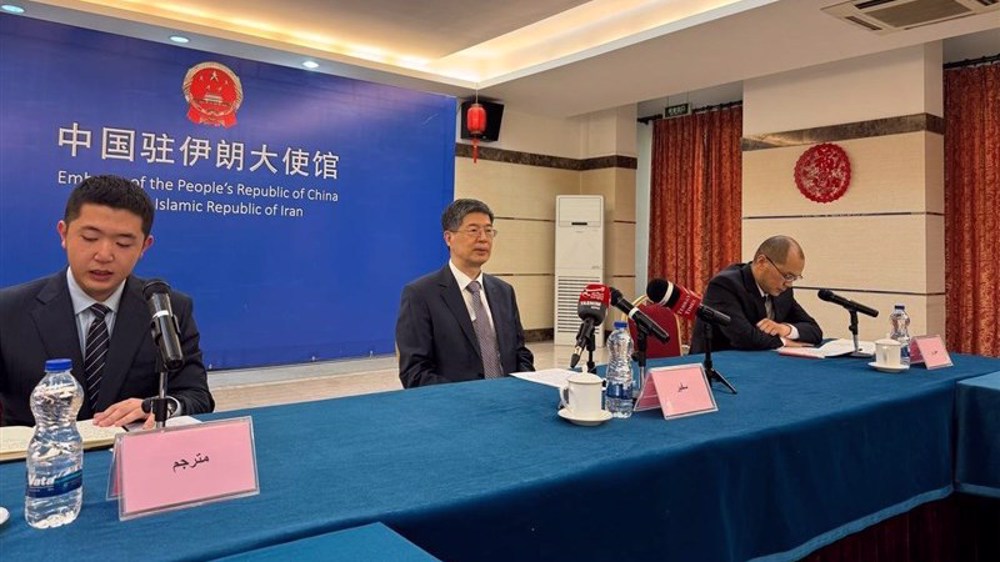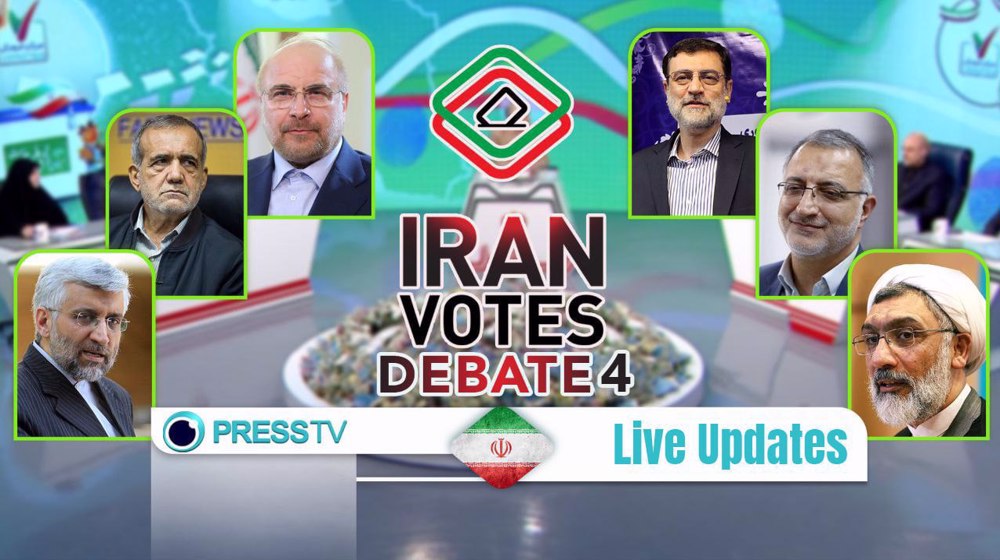Highlights: Fourth debate in 2024 Iran presidential election
The fourth televised debate in the 2024 Iranian presidential election was held on Monday night, with six contenders presenting their blueprints on the country's foreign policy.
This debate followed three other invigorating debates held in the past week, two of which centered on economic issues and the other one on cultural issues.
Campaigning for the snap presidential election, scheduled for June 28, is in full swing, with six candidates in the fray—Mohammad Baqer Qalibaf, Masoud Pezeshkian, Amir-Hossein Ghazizadeh Hashemi, Alireza Zakani, Mostafa Pourmohammadi, and Saeed Jalili—pulling out all the stops to win voters' favor.
Here are highlights of the fourth televised presidential debate hosted by the Islamic Republic of Iran Broadcasting (IRIB).
Zakani:
- Don't allow anyone to build walls between you (people). Inside and outside the country, all Iranian people are the same. You all seek justice and oppose corruption.
- Don't let them draw lines based on ethnicity and gender among you (people). No one has the right to pit the people against each other. It's unity that will prevail.
Jalili:
- We (Iran) can become a hub for certain goods in the region.
- The essence of foreign policy work is defending the rights of the people and the interests of the country. We propose new mechanisms regarding sanctions: they should not only be lifted but the sanctioning parties should regret their actions.
- We have plans on how to generate foreign currency and employment through foreign policy, utilizing tourism for currency generation or maximizing transit opportunities.
- Today, we have a good opportunity to become a regional hub for certain goods.
- Our scientists today, some of whom are concerned about migration, do so because we haven't managed to create markets for them. However, we can create employment and empower the country by utilizing their technologies and knowledge.
- Today, we need someone who can create consensus (in the country)
Pourmohammadi:
- The primary goal in (my) government is to develop national economy, create wealth for the people of Iran, and lift sanctions.
- Our effort is to solve the country's issues in the shortest time with the greatest benefit.
- We have been trapped in the maze of sanctions for over 15 years.
- JCPOA is not a magical solution but rather a path to lifting sanctions.
Qazizadeh Hashemi:
- Foreign policy is not the realm of poetic mysticism or idealistic rhetoric. It's about action, not slogans.
- We must negotiate and work diligently in a way that the enemy's motivation and greed dries up.
- President Raeisi understood the language of the world precisely.
- If you want the screws of sanctions to loosen, this country needs the continuation of the clever, realistic, and heartfelt path laid by Martyr President Raeisi.
- Instead of focusing on differences, we should plan based on our commonalities with other countries.
- Confrontation and negotiation are not mutually exclusive. To reach a good understanding with the opposite side, we must first demonstrate our strength.
Pezeshkian:
- The basis of my foreign policy is dignity, wisdom, and national interest.
- One of my tasks (as president) is to prevent emigration of Iranians abroad and repatriating Iranians back.
- I want Iranian fathers and mothers to sit next to their children and grandchildren every Nowruz (New Year), not just wave from behind mobile screens.
Qalibaf:
- Our people have decided to move forward and build the dream of a great Iran. Just as they envy our defense capabilities, let it be the same in the economic field as well.
- We cannot embark on a path that would bring tension and problems to the country. Today, we all need to stand together, hand in hand.
- I had the fortune of serving for 12 years as the Mayor of Tehran. All three governments (at the time) did not assist me.
- We did not use the excuse of not having money (in Tehran Municipality). A strong manager means having the power of consensus.
Zakani:
- We should make the people partners in the country's wealth and be trustees of the people. We shouldn't draw walls in politics between the people, not pit ethnicities and religions against each other.
- We should accept all the flowers and gardens that exist in our country.
- No one has stopped JCPOA. In fact, we are pursuing the implementation of JCPOA. We have fulfilled our part, but they have not. They have betrayed and set it on fire.
Jalili:
- Why was economic growth zero and negative in the years when the JCPOA was signed?
- We must make the enemy regret its actions (of imposing sanctions on Iran) and for that, we have an action plan.
- The field of foreign policy has ample opportunities. In Sri Lanka, half a billion dollars of technical engineering services exports have been signed with dozens of countries. We can do this.
Pourmohammadi:
- I had reservations about the JCPOA from the very beginning. (Anti-Iran) resolutions have made the nation helpless.
- So much damage has been inflicted on the Iranian people in 15 years, and the country has suffered hundreds of billions of dollars in damage.
- We take pride in the culture of resistance in the world. We have defended the oppressed people for 45 years (since the revolution).
Qazizadeh Hashemi:
- We are capable of defending the performance of our (Raeisi) government. Others should also defend the governments they were part of or supported (from outside).
- The work done during President Raeisi's government in the area of handing over affairs to the people is not comparable to previous administrations.
- We saw an extraordinary increase in oil sales, which even a US senator admitted to the US Secretary of State that they (Iran) raised (oil sales) from 300,000 barrels to 2 million barrels and said President Raeisi was determined (to do it).
- Some thought if Amir-Abdollahian wasn't there, we would fix relations with regional countries. They sidelined him but it didn't work. Then when Martyr Amir-Abdollahian became the (foreign) minister, he solved these issues, and relations were established.
Pezeshkian:
- If we don't resolve the JCPOA and FATF issues, we must create internal cohesion. It means the people are our capital, and we must reconcile with them.
- Qatar, UAE, Oman, and Kuwait take their share in joint fields. We are losing our capital.
- The defensive and deterrent power that the IRGC and the Iranian Army have built is a source of pride for our country.
- One of the reasons others (enemies) cannot act against us (Islamic Republic of Iran) is precisely the capability of our drones and missiles.
Qalibaf:
- Today, people are facing problems with minimum living standards.
- We must achieve economic growth (in the country) through the lifting of sanctions and creating sustainable jobs.
- People are in a situation where their patience is running out. We must solve their problems with short-term plans. So, my first task is to create a supportive shield for the people.
- We must compensate for the disparity between people's income and inflation.
- Many have taken housing loans, but their installments have matured and they haven't acquired housing.
- We will give 200 square meters of land to anyone who doesn't have housing that can be used for residential purposes. If this happens, the problem will be solved.
Jalili:
- In the past 2-3 years, I have said every university is a government in the shadow; that's the real scene. Not that I say what a shadow government is. Governments must be helped with correction and completion.
- Today our greatest opportunities lie in foreign policy, but some destroyed it in eight years. The dollar went from 3000 to 30,000 tomans, and 800 sanctions became 1500.
- Today, are you (Pourmohammadi) defending corruption cases? He (a former minister) should go to the court to get his verdict, not go on TV for debate.
Pezeshkian:
- We must resolve issues with (the help of) experts. If we don't address the current problems with this approach, we cannot easily solve the sanctions-related issues.
Qalibaf:
- Qassem Soleimani is a role model for us in matters such as: lifting sanctions, neutralizing sanctions, regional power, opportunities, and threats. All of these are lessons.
- What were the characteristics of Martyr Soleimani? He would talk with the same person he was fighting against.
- Diplomacy and the battlefield are both (powerful) tools. Negotiations are a method of combat. This is the roadmap of the Islamic Republic.
- The power of Martyr Soleimani was to create unity and consensus that we all talk about.
- Today, through security cooperation with our neighbors, we have thwarted US interference (in the region) and disrupted their hegemony. We must also take advantage of the economic opportunity that entails.
- We must pursue the lifting of sanctions and assert our rights under Article 6 of the Strategic Action Law, while also pursuing economic growth to neutralize sanctions.
Zakani:
- JCPOA needs to be criticized, and President Raeisi criticized it better than anyone.
- President Raeisi increased oil sales by 7.5 times and brought back the money (into the country).
- I wrote a €13 billion memorandum of understanding and a €2 billion agreement with China under these sanctions.
Jalili:
- If we talk about governing the country, one of the important issues is that the president should be knowledgeable and not make decisions hastily.
- If you don't understand the issue, incorrect diagnosis leads to incorrect prescriptions.
Pourmohammadi:
- Iran's middle class is stronger than any other in the world. Religious formations and guilds can shape the legitimacy of our government.
- Implementing joint projects such as water, electricity, and gas transfer is very important.
- One of the important aspects of diplomacy is economic diplomacy. Regional agreements have progressed well, thanks to the late President Raeisi's government.
Qazizadeh Hashemi:
- In Martyr (President) Raeisi's government, we pursued the revival of Iran's power (in the world) and we succeeded.
- Iran has always been an inspiration to the countries of the region and today it is an inspiration to countries around the world.
- We consider the economy and security of neighbors as our security and economy.
Pezeshkian:
- I am a principlist, but I am fully committed to reforms. The principles I adhere to are rights and justice (related to people).
- From day one, I have said I accept the policies set by the Leader of the Islamic Revolution. What anyone else says to me doesn't matter.
- Martyr (President) Raeisi pursued the issue of JCPOA. We must work hand in hand to solve internal problems.
Qalibaf:
- If our oil sales are freed, we can reinstate the Additional Protocol; if they free our ports, insurance, and central bank from sanctions, we can fulfill commitments.
- Regarding the neutralization of sanctions, we have significant opportunities such as Eurasia, SCO, and BRICS.
- We have $25 billion in open contracts with countries all opposed to America with whom we can work, but we lack unity of approach.
- But we do not have a unity of approach inside the country because we have differences among the apparatus.
- 25% of the country's constructed railroads do not yield economic benefits for us, but if we pursue a different policy, our country's situation would be better.
- We will establish our second economic capital in Chabahar (Sistan and Baluchestan province).
Alireza Zakani:
- In a book titled "Idea-Centric Foreign Policy, Based on Ambitious Diplomacy," I have outlined my foreign policy ideas.
- The world is changing, and we cannot achieve a proper power position in the region and the world with old models and approaches.
- What happened in "Operation True Promise" and "Operation Al-Aqsa Storm" has changed the equations of the region.
- We must utilize all capacities and make others dependent on us, rather than being dependent on others.
- BRICS and the Shanghai Cooperation Organization (membership) have created new opportunities for the Islamic Republic of Iran.
Saeed Jalili:
- When we talk about opportunities, a significant part of them lies in foreign policy.
- The problem is that you only interact with two or three countries that not only provide you with opportunities but also pose threats. We need to consider the whole world.
- Opportunities in foreign policy take shape when countries create collaborations and interactions, especially in the economic sector.
- Today, we have two main issues in the country: employment and earning foreign currency. These two should be reflected in our foreign policy.
- Each of our embassies should be an export platform, and they should have a mission defined for employment and earning foreign currency for the country.
- From Latin America to Africa, our neighbors, and countries in the resistance axis can create opportunities for us, we should not overlook them.
Mostafa Pourmohammadi:
- Foreign policy is an extension of domestic policy. If we are strong domestically, we can achieve and solidify our goals internationally.
- The important issue in the country is elections. The leader of the Islamic Revolution has stated that national authority is produced through participation (in elections).
Amir Hossein Qazizadeh Hashemi:
- On the issue of neighbors and neighborhoods, Iran's policy has always been to establish peace and prevent foreign interference.
- (Hamid) Nouri and (Asadollah) Asadi were released (in foreign countries) due to foreign policy pursued by the Martyr Raeisi government
- Martyrs Raeisi and Martyr (Hossein) Amir-Abdollahian demonstrated that they were masters of interaction and negotiation (with the world).
- Relations with Saudi Arabia were restored, with Mohammad bin Salman seeking to enhance personal relations with Martyr Raeisi. The issue with Egypt was resolved, and contracts with India, Russia, and China reached operational stages, and we joined BRICS and the Shanghai Cooperation Organization.
- Eight countries around the world, with a population of two billion people, declared public mourning after the martyrdom of Ayatollah Raeisi.
Masoud Pezeshkian:
- If we want to solve our economic and international problems, we need to arrive at a consensus and gain the satisfaction of the public.
- In the region, we can be the transit route from East to West and bring most advantages. Why couldn't we achieve this? Because we are in conflict both among ourselves and with our neighbors.
- We will secure our share of the market through dialogue with neighbors and unity and cohesion at home.
- Our advantages are oil, gas, and our geopolitical position. Why haven't we been able to use these advantages?
- Martyr (President) Raeisi made commendable efforts to resolve issues with neighboring countries.
- We need to finalize the (issue of) FATF because, under current conditions, we buy expensively and sell cheaply.
Mohammad Baqer Qalibaf:
- The most important issue for our success is to be able to create a national consensus.
- Our domestic policy is an extension of our foreign policy and vice versa.
- Like Martyr (President) Raeisi, we will continue negotiations and certainly reach an agreement, within the framework of policies and laws (of the country), including the Strategic Action Law of the Parliament.
- We will pursue any agreement that brings economic benefit (for the people of the country).
- We need to promise people that our primary concern is solving their economic problems.
- Martyr Soleimani believed our opportunities lie within threats. My priority in diplomacy is the policies and decisions of the leadership.
- We have tens of open and unresolved cases. Our priority is to ensure we no longer have open cases. We need consensus both domestically and internationally.

Iran, Turkey foreign ministers discuss Muscat talks, other regional issues

Leader: Indirect Oman talks ‘good’ in early stages but lack of trust 'remains' about other side

China calls for new Iran deal based on JCPOA; urges US to stop ‘maximum pressure’
Iran’s enrichment ‘non-negotiable’, talks fruitless under pressure: FM
Pentagon officials placed on leave over 'unauthorized' Yemen leaks
Photojournalist killed in Israeli bombing of family home in Gaza
China says 'not afraid to fight' trade war with US
VIDEO | Press TV's news headlines
Iranian hospital uses angiography for brain vascular treatment without surgery
US to press EU to pull away from China in return for tariff cuts: Report
Muslim prisoners ‘singled out’ for violent treatment in England: Charity







 This makes it easy to access the Press TV website
This makes it easy to access the Press TV website